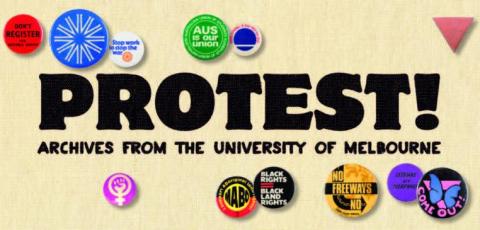
By Alana Lazdins.
The exhibition, ‘Protest! Archives from the University of Melbourne’, at Leigh Scott Gallery in The University of Melbourne’s Baillieu Library features photographs, written histories and a wide range of ephemera documenting student activism on campus during the 1960s–1970s. The exhibition locates student dissent as the catalyst and driving force behind multiple political and social campaigns across Australia extending well beyond the university milieu.
The written histories detail how marginalised and socially ostracised groups experienced oppression in Australia and the role protest and activism played in alleviating that persecution.
Along with its emphasis on historical events, the exhibition asks how archivists may enable the preservation of modern day protests, strikes and movements. ‘Protest!’ displays predominately printed broadsheets, letters and flyers used to instigate and spread protest in the later half of the 20th Century; a radical contrast to the role of digital/social media in modern day protests. This raises the question of how current generations will choose to document and retain information from notable events such as the Arab Spring, the Occupy movement and activities of feminist groups like Femen.
The exhibition itself is divided into seven categories; Anti-conscription, Women’s Liberation, Student Activism, Gay Liberation, The Carlton Association, The Immigration Reform Group and The University Assembly. The written histories detail how marginalised and socially ostracised groups experienced oppression in Australia and the role protest and activism played in alleviating that persecution.
As the viewer strolls through the gallery, she gradually becomes aware of the heightened political concern of past students, over a thousand of which barricaded themselves in the Raymond Priestly Building in 1971 for over four days. The viewer becomes aware of the more radicalised protest tactics of yesteryear, including women liberationists chaining themselves to doors of the Victorian Arbitration Commission to fight for equal pay. The viewer remembers that striking Victorian workers were instrumental in the success of the eight-hour day movement, a public holiday that the University of Melbourne no longer recognises.
The viewer then laments the apathy displayed by the bulk of the modern university community and hopes that this exhibition will once again reignite the passion and dissidence of past pioneering activists.
The Protest! Archives from the University exhibition is open in the Leigh Scott Gallery, Level 1, Baillieu Library, until 2 June 2013


